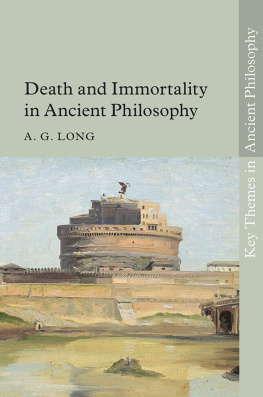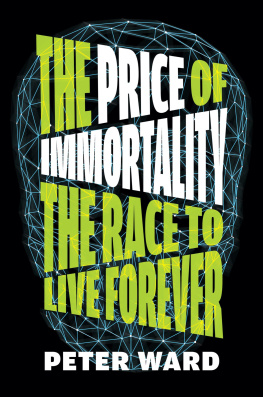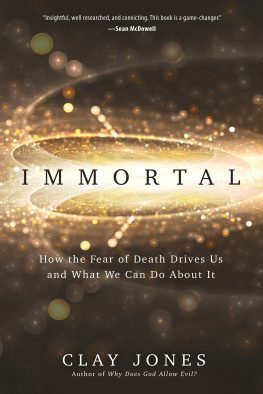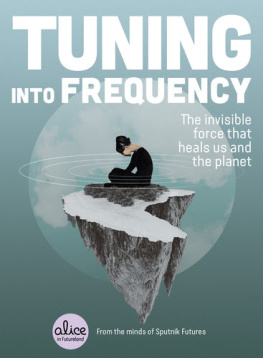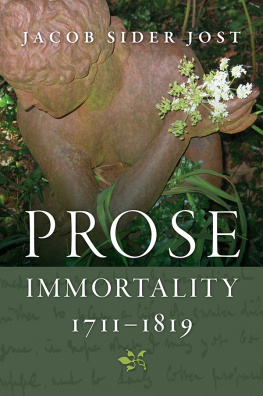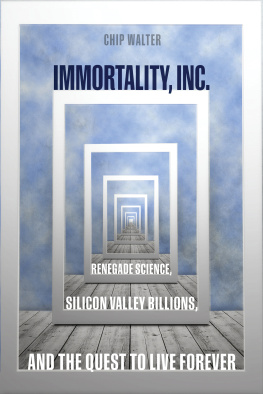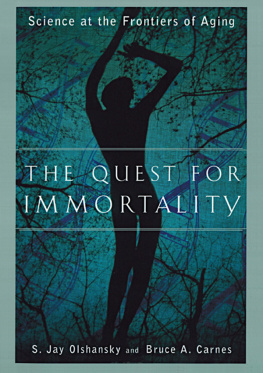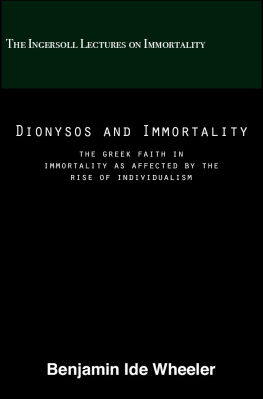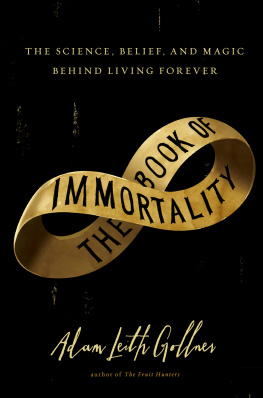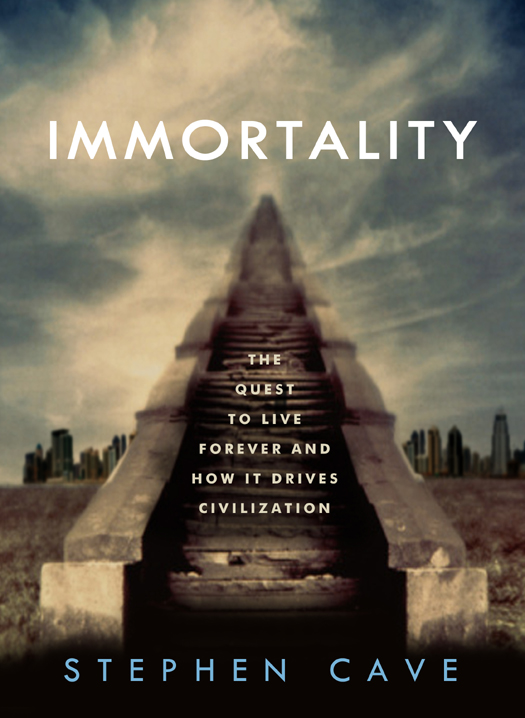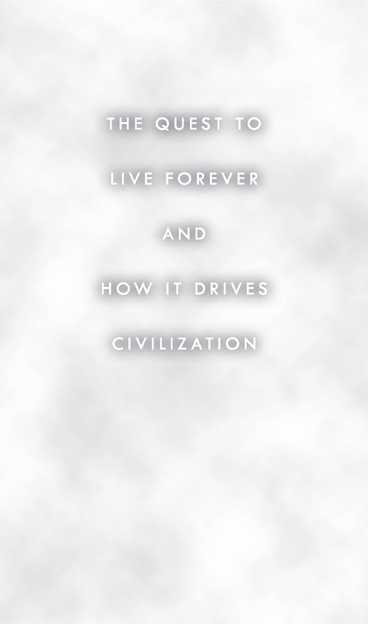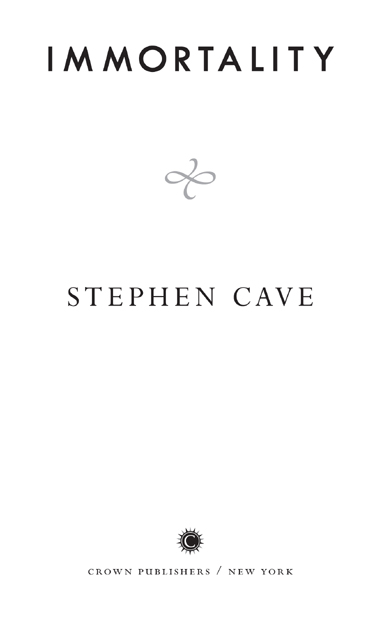Copyright 2012 by Stephen Cave
All rights reserved.
Published in the United States by Crown Publishers,
an imprint of the Crown Publishing Group,
a division of Random House, Inc., New York.
www.crownpublishing.com
C ROWN and the Crown colophon are registered trademarks
of Random House, Inc.
Library of Congress Cataloging-in-Publication Data
Cave, Stephen.
Immortality : the quest to live forever and how it drives
civilization / Stephen Cave.1st ed.
p. cm.
Includes bibliographical references.
1. Immortality (Philosophy) 2. Immortality. I. Title.
BD421.C38 2011
129dc23 2011023912
eISBN: 978-0-307-88493-0
JACKET DESIGN: WHITNEY COOKMAN
JACKET PHOTOGRAPHY: KAMIL VOJNAR , www.kamilvojnar.com
v3.1
For Friederike
C ONTENTS
A BEAUTIFUL WOMAN HAS COME
T HE F OUR P ATHS TO I MMORTALITY
MAGIC BARRIERS
C IVILIZATION AND THE E LIXIR OF L IFE
THE VITAMIN CURE
S CIENCE V ERSUS THE R EAPER
ST. PAUL AND THE CANNIBALS
T HE R ISE OF R ESURRECTION
FRANKENSTEIN REDUX
T HE M ODERN R EANIMATORS
BEATRICES SMILE
W HAT H APPENS IN P ARADISE
THE LOST SOUL
R EINCARNATION AND THE E VIDENCE OF S CIENCE
LOOK ON MY WORKS, YE MIGHTY
E VERLASTING F AME
THE IMMORTAL SEED
G ENES , G AIA AND THE T HINGS IN B ETWEEN
HE WHO SAW THE DEEP
W ISDOM AND M ORTALITY
P REFACE
T HIS is a book about life, death and civilization.
I aim to show how we, like all living things, are driven to pursue life without end; but also how we, alone of living things, have in the process created spectacular civilizations, with stunning artworks, rich religious traditions and the material and intellectual achievements of science.
All of this, I argue, we have done through following four paths that promise immortality. The final aim of this book is to ask if any of these paths can deliver on that promise and what the answer means for how we should live.
History is Philosophy teaching by examples, wrote Thucydides. I am a philosopher by training, but I have also drawn widely on the examples of history, as well as on insights from many other disciplines, from anthropology to zoology and most in betweenuniversities might divide up neatly into subjects and faculties, but life does not. When making such excursions into other fields, I have attempted broadly to follow consensus opinionthough I have also not shied from taking a stand when necessary for my own argument.
I am aware of the immodesty of making sweeping claims about such grand matters. Experts will shudder at my simplifications of complex debates, some of enormous antiquity. But it was always my intention to keep the book short and succinct, and I hope that some readers at least will be stimulated to go farther down alleyways of knowledge to which I could only briefly point.

A BEAUTIFUL WOMANHAS COME
T HE F OUR P ATHS TO I MMORTALITY
T HEY tried to destroy her. Hammers swung to smash the elegant nose and break her long and graceful neck. All across the kingdom, the statues and busts of the great queen were pounded to dust. Her name was chiseled from the monuments, its utterance banned. This embodiment of regal womanhood was never to be seen or spoken of again.
It was a sentence made to last for eternity: no cult would tend her tomb, keeping alive her soul with incense and offerings; she would not be preserved in dignity so that she might reign in the Otherworld. Her brief dynasty was extinguished. By systematically erasing her from history, the new pharaoh was not only purging Egypt of her ideas and influencehe was knowingly consigning her to cold, endless oblivion. Or so he thought.
Three thousand two hundred and thirty years later, Ludwig Borchardt, Egyptological attach of the German Reich, hurried across a dusty, pockmarked plain. His young assistant was waiting impatiently at the entrance to one of the many excavation pits; he explained that they had found the remains of a buried housethough it was once grand, it had seemed that thieves and the passage of time had left little of value. Then a local workman, clearing away thousands of years of muck and rubble, had found a section of wall that seemed bricked up in haste. The age-old blocks had given way at the touch of his chisel, falling into blackness on the other side.
Borchardt climbed into the ditch and made his way hastily through the dust and shadows to this secret chamber. Reaching the opening cleared by the workmen, he stepped carefully over the broken bricks. Pushing his torch ahead of him, he peered into the small roomand froze. Rows of stone heads gazed out at him like ghosts, lines of shimmering faces, each one unique, each perfectly rendered with the kinks and scars of lifea furrowed brow, a wrinkled smile. It was as if an assembly of these ancient people had gathered to pass on a message from the other side.
Then he saw her: on the floor, half hidden by a fallen ledge. With his bare hands, Borchardt thrust aside the debris to pull her out. When he held her up to the torchlight, he became the first man in over three thousand years to look upon the full beauty of Nefertiti.
Back in his office that night, December 6, 1912, Borchardt scribbled in his diary, absolutely outstanding; describing is useless, must be seen. Then he began plotting how he could bring the great queen back to his kaiser.
THE FOUR PATHS
A LL living things seek to perpetuate themselves into the future, but humans seek to perpetuate themselves forever. This seekingthis will to immortalityis the foundation of human achievement; it is the wellspring of religion, the muse of philosophy, the architect of our cities and the impulse behind the arts. It is embedded in our very nature, and its result is what we know as civilization.
Although magnificent in the scale and sophistication of its expression, ancient Egypts obsession with eternal life was otherwise no different from that of every society, ancient or modern, Eastern or Western. The dream of some kind of life without end is a universal feature of human experience, common to all cultures across time and placeand still today driving us on toward new achievements that surpass even the pyramids.
This book will do three things: First, it will show that beneath the apparent diversity of stories about how immortality is to be attained there are just four basic formswhat I will call the four immortality narratives. All attempts at everlasting life that have ever been madeand ever will befollow one or another of these four. From Egypt to China, New York to New Delhi, people today are following these narratives in the belief that they will deliver them from death, just as people always have. We can imagine them as four paths leading toward the mythical Mount of the Immortals.


